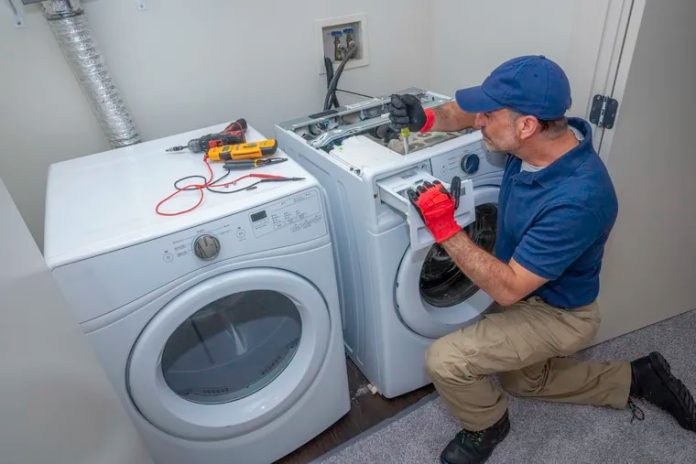Household appliances used to be designed to last. Those tried and tested avocado green stoves and refrigerators from the 1960s and 1970s worked well into the 2000s. But more complex features and less durable parts means the machines we rely on tend to be less reliable.
When your equipment fails, you need a quick fix. The nonprofit Delaware Valley Consumers’ Checkbook evaluated local appliance repair services and found stores that had good customer ratings and low prices. Choose your store carefully: some were rated “superior” for overall service by more than 90% of the customers surveyed, but others received such positive ratings from less than half of the customers surveyed. To help you find quality service, Inquirer readers can view local appliance repair service reviews and tips from Checkbook for free through July 5 at Checkbook.org/Inquirer/Appliance-Repair.
You should look around for the price. Checkbook’s undercover shoppers priced specific repair jobs and found that price differences between stores can be significant. For example, the price for replacing the baking element on a GE Cafe Series oven (model C2S985SET6SS) ranged from $130 to $399, and the prices for replacing the washing machine door seal on a front-loading washing machine from LG (model WM2140CW ) ranged from $163 to $399 and $500.
When looking for a repair shop, first check whether the device is still under warranty. If so, you are limited to factory authorized repair shops. Unfortunately, manufacturers don’t necessarily select the best companies to perform their warranty repairs. Manufacturers rarely, if ever, check the quality of their authorized shops, and those who do often only occasionally conduct superficial reviews. Checkbook found that garages that perform warranty repairs receive far lower ratings from their customers than garages that don’t.
Once you find a good repair service, you need to know how to use it. Here are some guidelines.
Before the repair service arrives
-
If you’re calling to make an appointment, ask how the company calculates the charges — specifically what the minimum charge covers. Also, find out about the company’s policy on travel expenses if the technician needs to return to the shop to get parts. Repair services do not usually charge for travel time for the second visit, but make sure they do. If the company charges on a time and materials basis, ask how they calculate time costs.
-
Describe your device’s problems in as much detail as possible: when the problem occurs, what it sounds like, and how the device responds to various settings. This helps the company dispatch the right technician, fit the necessary parts into the truck, and allocate enough time for the job.
-
Before the technician arrives, clear everything away from the unit so work can begin immediately.
When the technician arrives
-
Describe the problem of the device to the technician exactly as you did on the phone. Avoid offering your own diagnosis, otherwise the professional may perform the repair you have requested instead of repairing the machine.
-
Upon completion of the diagnosis, request a final price for the repair. If you think the quote is too high, ask the technician how long the quote is valid and if there will be any additional travel expenses for the return – many companies give you a few days to think it over and do not charge additional travel expenses. Then call some other repair services to get price quotes.
-
Ask about warranties on parts and labor.
-
Ask for replaced parts.
-
Before paying, get an invoice with your name and address; Company name and address; a description of the repaired device, including make and model; date of delivery; individual fees; and any warranty of parts, labor or both.
-
If you can, pay by credit card. If there is a problem, you can dispute the transaction with your credit card issuer.
Repair or replace?
Before you service an older device or commit to a costly repair, you may need to make a decision: repair or replace? It’s not always a clear decision.
For example, the “average lifetime” for devices can be misleading. If you have a device that is seven years old and has an average lifespan of 12 years, chances are it will last well beyond that average. Also, don’t assume that because one component of a device breaks, others will soon follow. The device could last for years without further problems. Also consider your usage – if you only wash a few loads of laundry per week, the washer/dryer is likely to last longer than average.
On the other hand, you might want new features, a new look, or greater energy efficiency. Keep in mind that some appliances, such as clothes dryers, aren’t much more efficient today than they were years ago, and even with appliances that have progressed, if you only do a handful of laundry loads per week, the energy use won’t change.
On the other hand, you’ll be doing the world – and your electric bills – a huge favor if you get rid of old fridges or freezers.
Delaware Valley Consumers’ Checkbook Magazine and Checkbook.org are a nonprofit organization with a mission to provide consumers with the best service and lowest prices. We are consumer endorsed and do not take money from the service providers we review.
www.inquirer.com
https://www.inquirer.com/consumer/appliance-repair-shops-philadelphia-how-to-choose-20230531.html














